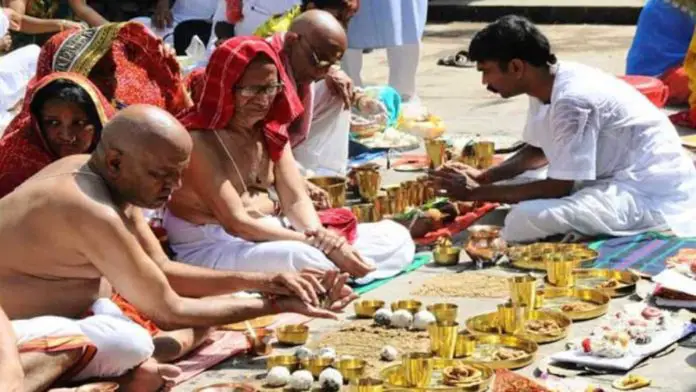Pind Daan is the Hindu ritual of offering prayers to the ancestors. It is done to commemorate the death anniversary of a loved one and to ensure their passage into the afterlife. The ritual is also believed to bring peace to the departed soul. Pind Daan can be done on any day, but it is usually done on the death anniversary or on specific festivals such as Mahalaya and Pitru Paksha. The ritual involves offering pinda (rice balls) to the ancestors and is usually performed at a sacred place such as a temple or ghat. If you want to perform Pind Daan for your ancestors, then you must first understand the process and what it entails. In this blog post, we will explore everything you need to know about Pind Daan, from its origins to how it is performed today.
Pind Daan is a ritual performed in India
A ritual performed in India, typically by Hindus, to honor their ancestors. The word “pind” means “body” and “daan” means “donation.” The act of Pind Daan is considered to be a way of showing respect and gratitude to one’s ancestors, and it is often done as part of the annual Pitru Paksha festival.
There are many different ways that Pind Daan can be performed, but the most common method is to offer food and water to the departed soul. This is typically done at a holy place such as a river or lake, and the offerings are usually made on behalf of the deceased person’s family. In some cases, Pind Daan may also involve the burning of special items such as cloth or paper.
A important ritual for many Hindus, and it is often seen as a way of ensuring that the departed soul rests in peace. It is also believed that by performing this ritual, one can earn the blessings of their ancestors.
It is done to remember and honor the ancestors
Pind daan is a religious practice in Hinduism whereby pinda (balls made of rice, wheat, barley and sesame seeds) are offered to the departed ancestors. This act is believed to liberate the soul from purgatory and help the ancestor attain moksha (liberation). The offerings are usually made at a sacred river such as the Ganges, Yamuna or Saraswati. Pind daan can be performed any time after the death of a close relative, but it is most commonly done on auspicious days such as Pitru Paksh (a period of 15 days when Hindus pay homage to their departed ancestors), Amavasya (the new moon day) or Shraddha (a day dedicated to ancestor worship).
It is usually done during special occasions such as Diwali or Pitru Paksha
Pind Daan is a ritual that is performed in order to pay homage to one’s ancestors. It is usually done during special occasions such as Diwali or Pitru Paksha. The ritual involves offering food and water to the departed souls, as well as reciting certain mantras. Pind Daan can be performed at any time, but it is considered to be more effective when done during these special occasions.
The ritual involves offering food, flowers and water to the ancestors
Pind Daan is an important ritual in Hindu cremation that is performed to offer food, flowers and water to the ancestors. This ritual is usually performed during the months of Shravan and Bhadrapada, but can be done at any time of the year. The main purpose of this ritual is to provide peace and happiness to the departed soul, and to ensure their well-being in the afterlife.
During the Pind Daan ritual, a small fire is lit and offerings of food, flowers and water are made to it. The offering should be made with love and sincerity, and all negative thoughts should be banished from the mind. After the offerings are made, a prayer is recited for the departed soul, asking for their forgiveness and blessings.
This ritual can be performed by anyone who has lost a loved one, regardless of their caste or religion. It is a way of showing respect and honor to those who have passed away, and helps to bring peace to the grieving family members.
It is believed that by doing this, one can achieve moksha or liberation from the cycle of birth and death
There are a number of reasons why people choose to perform Pind Daan. For some, it is seen as a way to liberate the soul of a deceased loved one from the cycle of birth and death. It is believed that by performing this ritual, the soul will be freed from the cycle and be able to move on to the next life. Others see it as a way to ensure that the deceased will have a good rebirth. Still others believe that it is a way to propitiate the ancestors and ensure their blessings. Whatever the reason, Pind Daan is an important ritual for Hindus.
Conclusion
Pind Daan is a Sanskar performed by Hindus to pacify the soul of their dead ancestors. It is done on special occasions such as Amavasya, Diwali, and Pitru Paksha. The ritual involves offering water and food to the crows who are considered to be the messengers of Yama, the lord of death. Pind Daan can be done either at a designated place like a temple or ghat, or at home.




